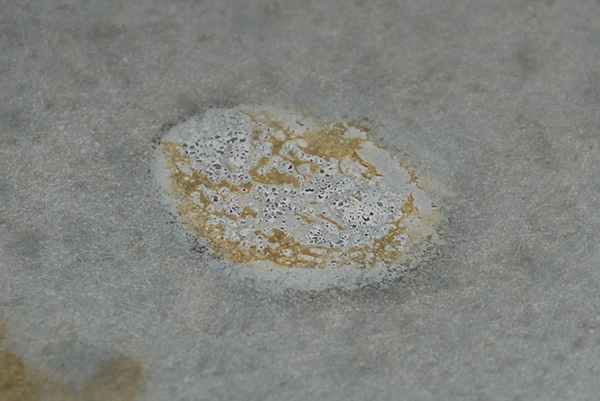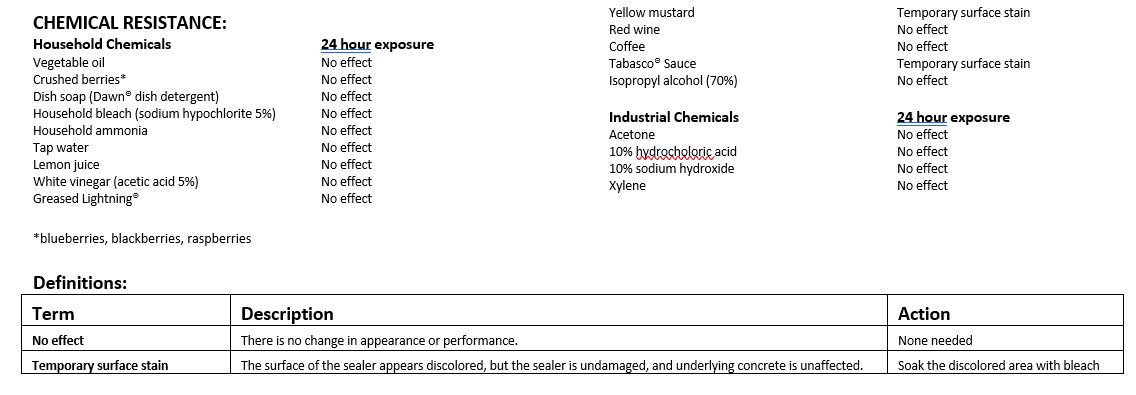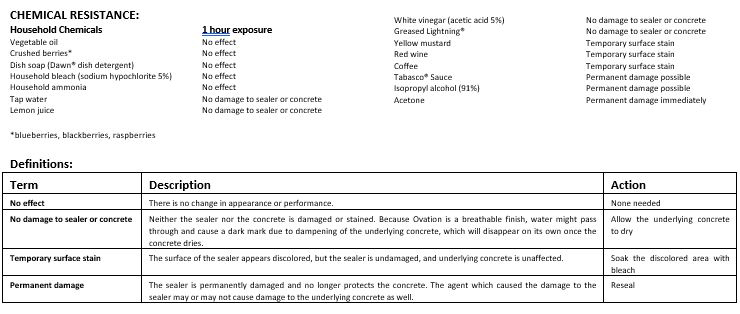We seal concrete countertops, furniture, sinks, etc. to protect them and to preserve their appearance. Sealed concrete is easy to live with, easy to care for and easy to clean. Good concrete countertop sealers give you peace of mind, and if something unexpected happens, make it easy to fix.
What Does Concrete Countertop Sealer Really Do?
The fundamental job of a sealer is to protect the underlying concrete from damage or stains. It is always easier to reseal undamaged concrete than it is to replace or repair the concrete should it get damaged. No sealer is perfect or does everything, but depending upon its chemistry and makeup, a sealer can prevent permanent damage or staining from occurring.
Sealers can be thought of as a layer of armor that shields the concrete from the outside world, and different sealers have different levels of performance and protection. The ideal sealer is one that is cheap, easy to use, and stands up to any and everything, but unfortunately that sealer doesn’t exist. What does exist are real sealers that can give great performance.
Before we talk about performance levels and which sealers meet them, it is important to understand what a “stain” actually is.
The Difference Between Staining and Damage
The term “stain” is often applied generically to anything that negatively changes the appearance of concrete, but there is a difference between a temporary visual change and actual damage. It is important to understand the difference between a “stain” and “damage”.
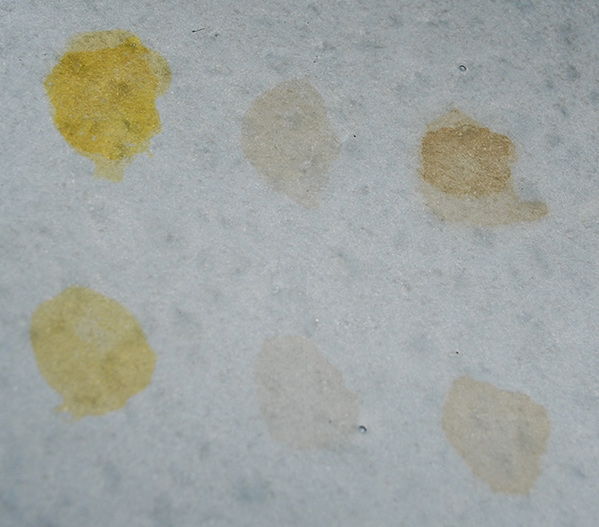
Stains, defined properly, are changes that alter the color, shading or appearance of the sealer or the concrete and can be removed with certain cleaning techniques. Usually stains are caused by the color of food: red wine, yellow mustard or coffee.
Stains are not physical damage and are usually confined to the surface of the sealer. Most stains can be removed from both sealer and concrete by soaking with household bleach for a period of time.
Oil is a very difficult stain to remove from concrete because it penetrates deeply. Oil generally requires a poultice of baking soda and acetone to remove. This method cannot be used if it is going to come into contact with a sealer that does not resist acetone.
Unlike stains, which are almost always temporary and fairly easily removed, etching damage from acid is a lot worse. Unsealed concrete is vulnerable to acid because acid from lemon juice, vinegar or other acidic foods or materials chemically dissolves the cement paste that binds all the ingredients together. The concrete has literally been eaten away, and it will feel rough to the touch.
Some poorly performing sealers such as most acrylics don’t stop acid etching from happening. Etching is actual damage to the concrete, and damage can’t be removed, it has to be repaired.
Repairing etched concrete involves filling in the recessed areas with cement-based grout like that used to fill pinholes. Repairs done in this way will be visible; there is no way to restore the concrete to its exact former appearance.
Performance Levels of Concrete Countertop Sealers
The ideal sealer is completely unaffected by any substance placed on its surface for any length of time. The ideal sealer does not exist, so it is helpful to understand various levels of performance possible with various types of concrete countertop sealers.
Here’s how to evaluate a sealer’s performance against various substances:
- First Degree, No Effect: Neither the sealer nor the concrete is stained nor damaged, and the sealer continues to perform like new.
- Second Degree, Temporary Stain: There is a surface stain on the sealer or the concrete that can be removed with bleach or other cleaning methods. The sealer continues to protect the concrete.
- Third Degree, Sealer Damaged: The sealer is permanently damaged, but the underlying concrete is unaffected. The damaged sealer has lost its ability to protect the concrete in the affected area. The sealer must be reapplied.
- Fourth Degree, Permanent Damage: The sealer and the concrete are permanently damaged. The sealer failed and was unable to protect the concrete and allowed etching to occur. The concrete itself must be repaired, then sealer reapplied.
Which Concrete Countertop Sealers Perform Best
For whatever sealer you choose, it is important to understand which degree of protection you can expect for various substances, and for how long. It is also important to consider trade-offs:
- Professional grade concrete countertop sealers trade cost and simplicity for extreme performance, standing up to just about anything for 24 hours or more.
- Simpler and more economical finishes rely on less complex chemistry to deliver easy-to-care-for performance.
Which you choose depends upon your needs, lifestyle, budget and experience level.
Professional Grade Concrete Countertop Sealers
The toughest, professional-grade sealers not only protect the concrete and keep it pristine, they also are very chemically resistant to a wide range of materials, especially harsh substances like strong acids, and solvents like acetone. With these types of finishes, little or no maintenance has to be done, and the main cause of damage comes from scratches and cuts.
(Note that in this article we are addressing coating sealers, not penetrating treatments, and focusing on stain and acid resistance, not scratch resistance. For more this topic, please see this article.)
– Professional grade high performance sealers should provide 1st Degree or 2nd Degree performance for all substances up to 24 hours.
Here is a performance chart for Omega Concrete Countertop Sealer showing 1st Degree or 2nd Degree performance for all substances up to 24 hours.
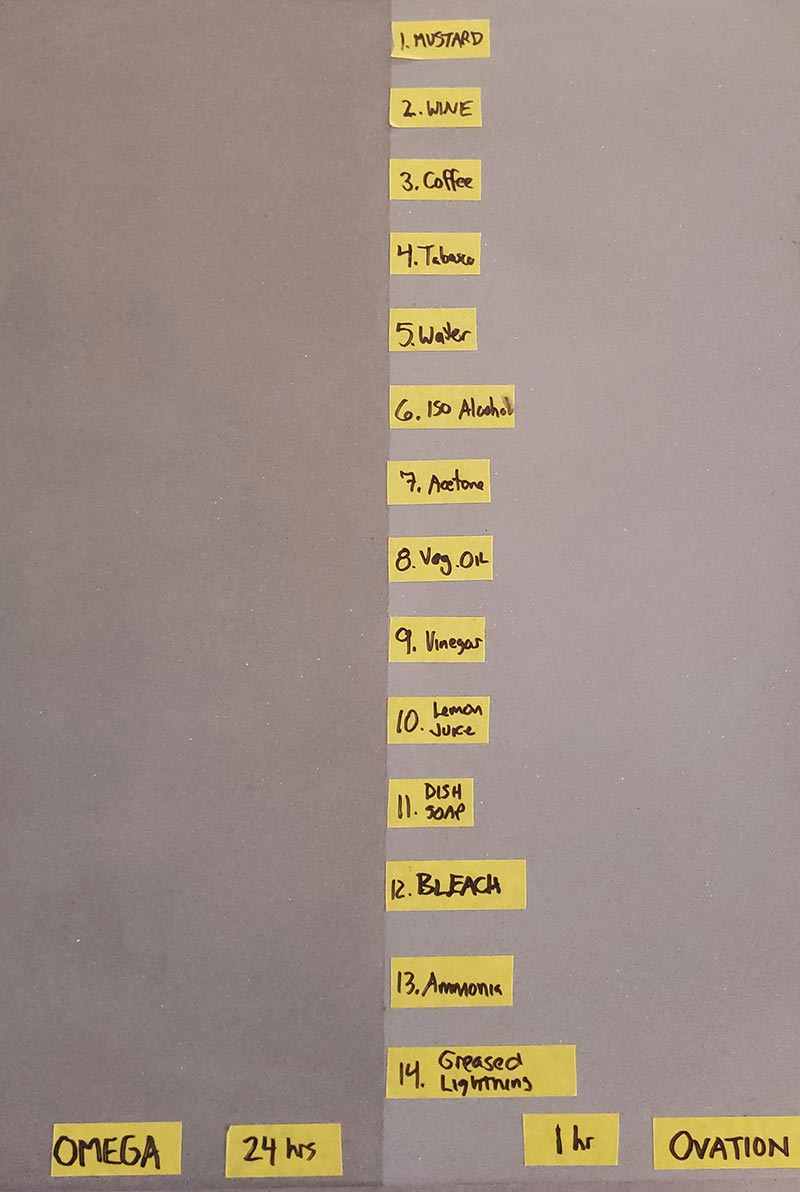
Omega, on the left, is unaffected by any substance tested after 24 hours of exposure. (Ovation is also unaffected, but after only 1 hour of exposure. Longer exposures can result in damage.)
Simple and Effective Concrete Countertop Sealers
Simpler sealers worth using can still give great performance and stand up to many common household staining agents. A good simple sealer shrugs off acidic substances. This is important because acid can do permanent damage to concrete. Although they can’t stand up to the full range of harsh chemicals that the pro-grade finishes can, they still protect the concrete from acidic substances.
These simple and effective concrete countertop sealers act like sacrificial layers when something really bad happens, still protecting the concrete and giving a clear indication that the affected area needs to be refreshed.
What’s important to note is that what usually damages theses sealers often doesn’t affect the concrete, since concrete is unaffected by acetone, alcohol, solvents, or most non-acidic cleaners. Acid, acidic substances, and harsh cleaners that have a pH lower than 7, are the serious threat to unsealed concrete. The effective simple sealers protect against acid.
– Simple and effective sealers should provide 1st Degree or 2nd Degree performance for most substances for at least 1 hour.
Here is a performance chart for Ovation Concrete Countertop Sealer showing 1st Degree or 2nd Degree performance for all substances except acetone for at least one hour. See also the image above.
Cheap and Ineffective Concrete Countertop Sealers
The cheap and ineffective concrete countertop sealers, typically acrylics, so commonly used by DIY’ers and poorly informed pros are attractive to them because they are very inexpensive, easy to use and dry very fast.
What makes them poor choices is that those sealers give a false sense of security, failing at their fundamental purpose: to protect the concrete. These kinds of sealers don’t stand up to acidic foods, lemon juice or vinegar. Not only do the sealers fail, but the concrete underneath gets permanently damaged, requiring expensive and often ugly professional repair.
– Cheap and ineffective sealers often exhibit 3rd and 4th degree performance quickly for several substances, particularly acids and solvents.

